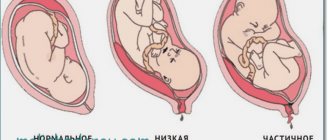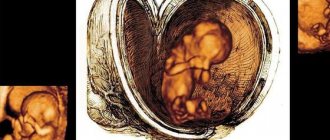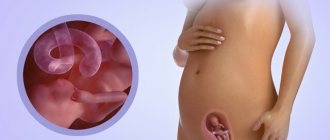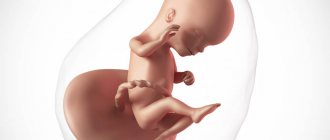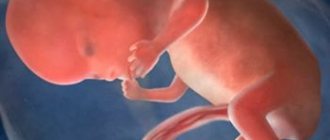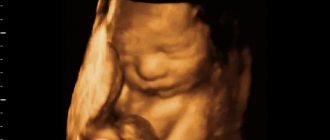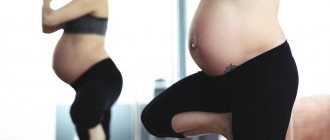Interesting Facts
| Options | Indications |
| Time from conception | 24 weeks |
| Period by month | 26 weeks |
| What month | 6 |
| Dimensions and weight of the fetus | 350 mm, 760 g |
| Uterus dimensions | At the middle of the distance between the navel and the xiphoid process, IMD - 23-26 cm |
| Pregnant weight | Gain from the beginning of pregnancy is 7-10 kg; over the last week no more than 400-500 g |
Your baby is the size of
Cantaloupe Melon
350mm Size
760 g Weight
At this stage, you probably regularly feel fetal movements and can even see them. These are amazing sensations that fill the expectant mother with peace and love. The baby is actively growing, you are gaining weight and therefore may feel uncomfortable. A duck's gait, smoothness in movements and some clumsiness appear. This week your unborn baby will open his eyes for the first time. They are already able to discern light through the abdominal wall. What else is important and you need to know about the 26th week of pregnancy?
Nutrition
Nutrition for a pregnant woman at 26 weeks of gestation
The nutrition of a pregnant woman at the 26th week is an important component of a favorable pregnancy. Following the principles of a healthy diet and monitoring the intake of a full range of nutrients into the body allows you to keep weight gain within limits, provide the fetus with all the necessary elements, and maintain the health of the expectant mother. This week you should pay attention to products containing:
- vitamins A, B, C, D and E;
- iron, potassium, calcium, magnesium.
Ideally, your diet will include:
- red meat;
- lean fish;
- offal;
- chicken eggs;
- cottage cheese and cheese;
- broccoli and cauliflower;
- asparagus;
- potatoes, carrots and other vegetables;
- buckwheat and unpolished rice;
- apples, bananas and other fruits;
- rose hips, black currants and other seasonal berries;
- prunes, dried apricots and other dried fruits;
- pumpkin seeds, almonds, walnuts.
It is advisable to prepare foods by boiling or stewing, avoiding frying, smoking and salting.
It is ideal if you can reduce the amount of salt you consume to the minimum possible.
Vitamins
You should take multivitamin complexes at the 26th week of pregnancy only after they have been prescribed by a gynecologist. In the later stages, uncontrolled intake of vitamins and nutritional supplements can cause excessive weight gain by the woman and child. This can lead to complications during childbirth, so you should avoid self-prescribing vitamins and strictly follow the dosage prescribed by your doctor.
Feelings of the expectant mother
At 26 weeks of pregnancy, the normal weight gain is 7 kg. The fundus of the uterus is located 6 cm above the navel. It puts more and more pressure on the diaphragm, making breathing difficult. For the same reason, a woman feels heartburn.
The body experiences a double load, so you may often feel drowsiness, fatigue and weakness. Take care of yourself, try to get enough sleep and rest during the day. Maternity leave is coming soon, and it will be easier to do this.
A mucus plug forms in the cervix, the function of which is to protect against infections. Vaginal discharge may become heavier. Normally, they should be light, have a uniform consistency and a neutral odor. Curdled or purulent discharge is an urgent reason to consult a doctor.
Many women experience what is called “nesting syndrome.” I want to decorate my home, change the curtains and buy everything I need for the birth of my baby. This is a natural state established by nature. At this time, it is important to protect the expectant mother from emotional and physical stress.
Mom at 26 weeks
Indicators of normal weight gain for a pregnant woman at this stage are 9 kg. The tummy has already grown significantly, is rounded, and protrudes forward. There may be minor problems with the breathing rhythm: due to the actively growing uterus, the diaphragm rises.

Pleasant little things and surprises are important to a woman during pregnancy.
A sufficient amount of mucus has already accumulated in the cervix - a plug has formed. When the time comes to go to the maternity hospital, it will begin to move away - grayish or brownish spotting will appear on the underwear.
Normally, a pregnant woman at 26 weeks may experience vaginal discharge: a uniform consistency, white or grayish in color, which does not smell. An alarming symptom: the appearance of curdled, liquid, copious discharge, greenish or yellowish in color, with an unpleasant, pungent specific odor.
If pus is added to the overall picture, it’s time to see a doctor! There are symptoms of infection.
Another symptom characteristic of this period: false contractions, in medicine called “Braxton-Hicks contractions.” They do not cause pain, are infrequent and do not threaten the health of the child and mother. This is, in essence, practical preparation for the upcoming birth.
Feelings at 26 weeks of pregnancy
The most important sensation is the movement of a tiny lump inside the mother. You can feel the tremors already close to the pregnant woman - just put your ear to the tummy. If the baby does not play and tumble, you may be able to hear his heartbeat.

Dad can also feel the baby's movements
A mother can little by little feel and determine the temperament of her baby: all children are individual, some behave quietly, gently push their mother from the inside, and sleep more. Others kick, tumble and become active every now and then - their period of wakefulness is much longer and passes more noticeably for a woman.
It happens that in the hustle and bustle of the day, the expectant mother may miss the movement of her child - this can quite frighten her, in some cases, forcing her to visit a doctor. But the reason is not always bad - perhaps the baby is just sleeping, because for some reason the period of play begins for many babies during the mother's night sleep.
To make sure that everything is fine without resorting to a trip to the clinic, try just lying on the sofa and resting for a minute - the little person will immediately become more active and start pushing.
Analyzes
At this time, as always, general clinical blood and urine tests remain mandatory. Taking the latter is necessary to determine inflammatory processes in the urinary tract and allow one to assess the load on the kidneys (whether they can cope with the double task assigned to them).
As for blood sampling, it is carried out to check glucose levels, because an increase in sugar can cause the development of a serious disease - diabetes.

Count fetal movements
It occurs in a small percentage of pregnant women - about 2, but poses a risk of unpleasant consequences. For example, with elevated glucose levels, the child quickly gains weight and his blood pressure decreases.
To prevent such consequences, it is important to undergo timely examinations and, if the doctor identifies a problem, to follow the developed diet.
Another important point is anemia (iron deficiency in the body). A large number of women are susceptible to it. This can be determined by checking the hemoglobin level. The test results clearly demonstrate all deviations from the norm. In case of an underestimated amount, drug treatment is resorted to.
It is important for the expectant mother to properly adjust her diet, eat more foods that contain iron: buckwheat porridge, beef liver, pomegranate or diluted, not concentrated pomegranate juice. Additionally, take a course of vitamin supplements.
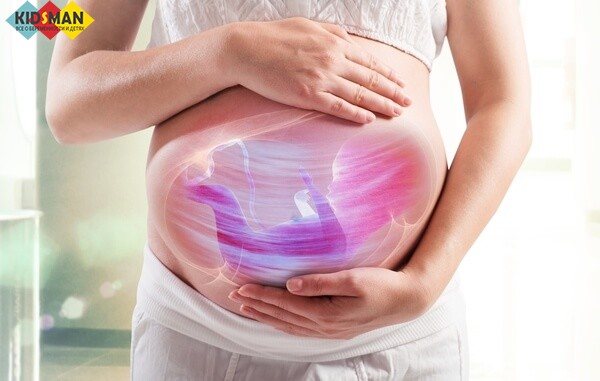
Every mother wants to see her baby on an ultrasound
Ultrasound at 26 weeks of pregnancy
If the pregnancy proceeds normally, without complications, the ultrasound procedure will be prescribed by the doctor no more than 3 times during the entire gestation period. The second scheduled ultrasound examination can be scheduled for exactly this period - 26 weeks.
Today there is already a high probability of 100% determination of a child’s gender.
The main goal of this procedure, however, is different: to assess the general condition of the fetus, its degree of development, and possible pathologies. What does the doctor pay attention to during a hardware examination:
- presence/absence of heart disease;
- pathologies of the urinary tract;
- development of the skeleton and skeletal system;
- genitals;
- problems or lack thereof in the nervous system;
- quantity and quality of amniotic fluid;
- placenta: place of its attachment, general assessment of the condition.

At this time, you can find out the sex of the child with an accuracy of 1 percent
Uterus
The size of the uterine cavity at 26 weeks reaches impressive dimensions: width – 16 cm, height – 24 cm. It is located 6 cm above the navel area, and the distance to the pubis is about 26 cm.
Interesting fact: every week the uterus rises higher, on average, by 1 cm.
A pregnant woman is often accompanied by heartburn, unpleasant bloating, and frequent constipation. A woman simply needs to monitor all her sensations so as not to miss the alarm bell to go to the doctor.
Symptoms characteristic of the uterus at 26 weeks are already listed above: painless training contractions and the formation of a mucus plug in the cervical canal.
If you suddenly feel stronger uterine contractions, which are accompanied by some pain, and watery liquid discharge appears from the vagina, call an ambulance. Often this can be a sign of labor starting prematurely.
Stomach
The uterus is constantly changing in size, rapidly increasing, which entails the growth of the abdomen. It protrudes forward, rounds, and rises slightly. Shortly before birth, it should drop - a sign that the baby is ready to be born.
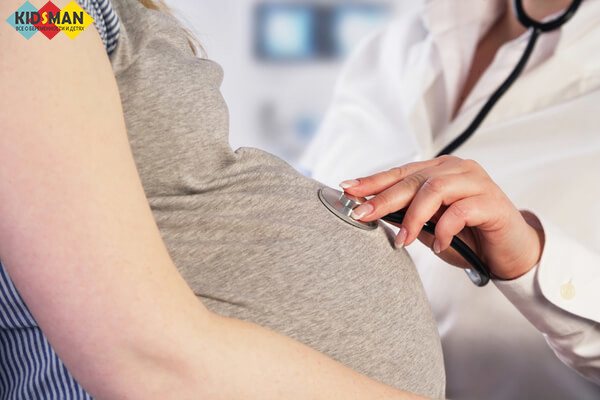
At the appointment, the doctor will measure the fundus of the uterus and listen to the fetal heartbeat
It is very important for a woman to take care of the skin of her abdomen, chest and thighs - an increase in body weight can cause the appearance of stretch marks (stripes on the skin, first pink, then white).
It is recommended to use moisturizing lotions, gels, and creams. Rub them into the skin with massaging movements after taking a shower or several times a day. You can use improvised means - olive, almond or vegetable oil, slightly heated to a pleasant (not burning the skin!) temperature.
It is better to prevent the appearance of stretch marks, because it will be very difficult to cure them after childbirth.
In addition to the appearance of skin defects, the woman experiences significant discomfort during sleep. The fact is that the tummy has grown, and when a pregnant woman turns on her side, it seems to turn over with her.
The optimal pose that will slightly relieve a tired spine is to lie on your side, slightly bend one leg at the knee and place a pillow (or a cushion from a blanket) under it. It’s not worth mentioning how harmful sleeping on your back is.
Temperature
Pregnant women often experience an increase in body temperature up to 37 degrees. This is considered normal and does not require immediate intervention with antipyretic medications or a call to the doctor.

Feeling unwell is a reason to see a doctor
Basically, the main reason is a change in hormonal levels, as well as a kind of defense of the body in response to a decrease in the properties of the immune system. An increase in temperature above the specified mark is an alarming symptom that may indicate an inflammatory process.
Cold at 26 weeks of pregnancy
If the temperature has risen, you need to understand the reason for its occurrence. Inflammatory or infectious processes may occur in the urinary system and kidneys. In this case, it is better not to take risks and seek qualified help.
For example, if you have a cold, it is better to provide yourself with the most calm environment, bed rest. If you work, take a sick leave for a couple of days. This is due to the fact that most medications are contraindicated for pregnant women, especially antibiotics and many well-known antiviral drugs.
You can turn to traditional medicine: drink more warm liquids, eat fresh fruits and vegetables. Berry juice helps with temperature. Be careful with honey - it can cause an allergic reaction.
If the above does not help, take ibuprofen or paracetamol. All proportions and frequency of administration should be agreed with your doctor.
In addition to elevated temperature, low temperature often appears (up to 36). There may be several reasons: a general decrease in immunity, iron deficiency in the body, stress, or simply fatigue.
A long walk in the fresh air, a restful sleep, or a course of vitamins will help you regain good health.

Group classes for pregnant women are very useful
Discharge at 26 weeks of pregnancy
The amount of discharge can increase significantly at week 26. This is directly related to the appearance of a mucus plug in the cervical canal. Light shade, absence of odor, uniform consistency - these are the main indicators of normal gestation at this stage.
It is worth paying attention to how you feel when there is abundant and unpleasant-smelling leucorrhoea, a cheesy consistency or an unusual color (yellowish, greenish, brownish or other). If these symptoms are accompanied by itching, redness of the external genitalia or peeling of the skin, there is an inflammatory process or candidiasis.
If there is an infection, it is necessary to urgently begin drug treatment, as this is fraught with damage to the membranes and penetration under the protective barrier of the fetus. If this happens, there may be a risk of infection for the child and a deterioration in his growth and development.
Even at such a long term, placental abruption is possible - this is accompanied by bloody discharge from the vagina and pain inside the abdomen. In this case, an ambulance is called.
It is also worth paying attention to leaking amniotic fluid - they can be recognized by copious watery discharge from the uterus, slightly yellowish in color. If such symptoms appear even in small quantities, it is better to consult a gynecologist.
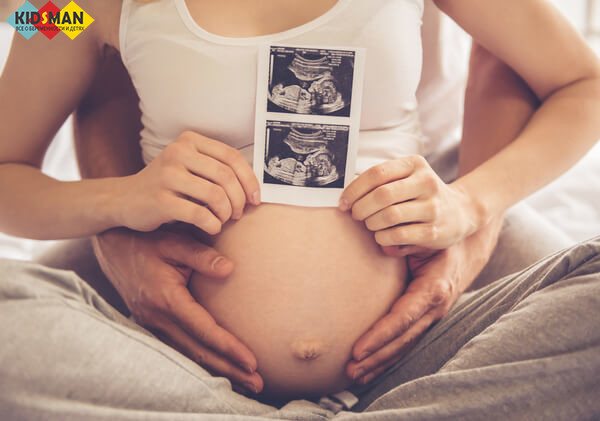
By this time, many mothers have an impressive collection of photographs of the child.
Pain
Due to the daily growth of the child and the stretching of the uterus, a woman can feel every kick of the baby. Sometimes it can be unpleasant, even painful. The impact of such a child’s activity is most often localized under the ribs or in the lower abdomen.
This is due to the work of hormones that soften joints and ligaments. Another reason is the growing uterus, which puts pressure on the internal organs. To alleviate the discomfort a little, it is better to lie on your side and rest.
The load on the lower limbs also increases more and more - this can sometimes cause cramps. A good way to relieve them is to lift them up from a rolled-up cushion or pillow and massage the feet and legs.
To avoid headaches, make it a habit to rest in a well-ventilated room with slightly cool air.
Back and lumbar pain is a common companion for a pregnant woman. A shifted center of gravity, load, the effect of hormones - the reasons are clear. Avoid uncomfortable high-heeled shoes that are too tight or unstable, do light gymnastic exercises, and strengthen your back muscles.
A good solution is to purchase a bandage. It will support the lumbar region, and in some cases it can prevent the appearance of unpleasant skin stretch marks.

The belly is already big enough
Complications
What unpleasant complications are possible at 26 weeks:
- pathology of fetal development;
- FNP. In simple terms, improper functioning of the placenta;
- premature birth;
- swelling;
- reduced blood pressure;
- gestosis.
Pay attention to your body and the appearance of alarming symptoms: strange discharge, its nature, burning sensation in the genital area, etc.
Nutrition at 26 weeks of pregnancy
A pregnant woman's diet should be as balanced as possible: fresh vegetables and fruits, lean meats, fish, cereals and dairy products. Refrain from visiting cookeries or canteens - cook at home yourself and only from fresh ingredients.
Fast food is not recommended, and smoked meats and pickles are of no benefit at all - salt retains water in the body, causing edema. Allergenic products not recommended: chicken eggs, honey, chocolate and cocoa products.
However, each body is individual, so if there are no side effects in the form of a rash, eat to your health! But in moderation.
To avoid heartburn, do not eat spicy or pickled foods; it is better to completely avoid carbonated drinks for a while. Prepare dishes by steaming, in a pressure cooker, boiling, baking - this cooking mode preserves the nutrients as much as possible.
Do not overdo it with sweets: simple carbohydrates are very difficult to digest and lead to weight gain for both mother and child. A lot of sugar in confectionery products can lead to diabetes.

Healthy eating is very important
Weight
Many unpleasant pain sensations are associated with rapid weight gain. This especially applies to the lower back and back area. At week 26, the maximum weight gain allowed is no more than 10 kg, remember this!
Control your weight, do not overeat - this has a bad effect on further pregnancy and childbirth. The ideal increase for each week is half a kilogram. Pay special attention to nutrition - eat healthy, properly prepared foods.
Sex
Intimacy at 26 weeks is not prohibited - moreover, it can bring unforgettable sensations. This is due to increased blood supply to the genital organs and sensitivity of the walls of the internal genital organs. In addition, during the process, the hormone of happiness - endorphin - is released into the blood of the expectant mother in large quantities.
It also has a positive effect on the baby’s body. Sex is allowed if there are no serious contraindications (risk of miscarriage, discomfort for the woman, etc.). It is recommended to choose poses that do not put pressure on the stomach.

Sex is not contraindicated at all
Baby development
The changes that occurred with the baby during the 2nd trimester of pregnancy are impressive:
- internal organs are formed;
- facial features appeared;
- he hears well and knows how to distinguish taste;
- his movements are coordinated;
- a daily routine appeared, including periods of sleep and wakefulness.
The average weight of a baby at 26 weeks of pregnancy is 760 grams. The amount of subcutaneous fat is rapidly increasing, thanks to which the child no longer looks thin, as it did just a couple of weeks ago. The average height is 35 cm. The skeletal system continues to strengthen, so the baby now needs calcium. Don't forget to consume fermented milk products rich in it.
The brain and central nervous system develop, memory is formed. The baby remembers, first of all, his mother’s voice and can distinguish it from all the others. The fetal heart rate is 130-160 beats per minute.
Tests and ultrasound
At 26 weeks of pregnancy, you may have a scheduled appointment with a gynecologist. Prepare for it by taking a general urine test 1-2 days in advance and writing down all your questions to the doctor in advance. The list will help you not to get confused or forget something important.
At the end of the 2nd trimester, you must take a general blood test, which will determine your hemoglobin level. This is important for the timely diagnosis of anemia, which leads to fetal hypoxia. Another important study is a biochemical blood test. An important indicator here is blood sugar level. It allows you to identify diabetes in pregnant women and adjust your diet if necessary.
Scheduled ultrasound is not performed during this period, only for special indications.
Visiting an obstetrician-gynecologist
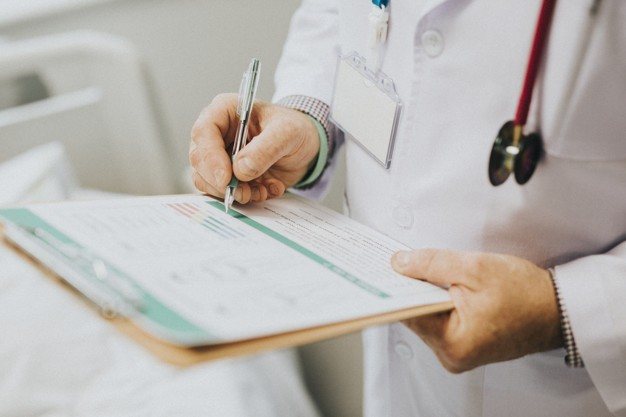
Medical examination at 26 weeks of pregnancy
At the 26th week of pregnancy, an appointment with a gynecologist is possible. Before the meeting you need to take the following tests:
- general urine analysis;
- general blood analysis;
- blood sugar test;
- Women with a negative Rh factor may be given an antibody test at week 26.
Directions for taking the necessary tests were issued during the last meeting.
During the appointment, the gynecologist will evaluate the test results and take measurements to monitor the development of pregnancy and the woman’s well-being:
- weight. Assessment of increase from the moment of registration;
- abdominal volume. Assessment of increase in waist circumference;
- height of the fundus of the uterus. Assessment of the parameter’s correspondence to the gestational age;
- arterial pressure;
- Body temperature;
- fetal heartbeat (using a stethoscope).
The doctor will interview the pregnant woman about any changes in her health and the presence of unpleasant signs. It’s great if a woman talks about all the sensations, oddities or exciting incidents that have arisen. It is recommended to ask all questions of interest that have arisen since the last meeting.
How to remember what to ask?
To prevent absent-mindedness and forgetfulness from preventing you from getting the necessary information from your doctor, it is good to have a special notebook that will be stored in a folder with directions for tests and things to take. Write down any questions you have in it and keep it in your bag with which you go to the doctor. The increased frequency of urination will most likely force you to visit the restroom, where, when taking out tissues, it is easy to find a notepad.
At the end of the appointment, the gynecologist will set a date for the next meeting and issue directions for the necessary tests.
Ultrasound
At the 26th week of pregnancy, a routine ultrasound is not performed. A referral for an ultrasound examination is issued if there are medical indications, if abnormalities in the development of pregnancy are suspected.
If desired, a woman can have an ultrasound scan for a fee to ensure that the pregnancy is progressing well.
Uterus and belly
At the 26th week of pregnancy, the fundus of the uterus is at a height of 4 to 6 cm above the navel, the height from the symphysis pubis is about 24 cm.
The belly continues to grow this week, adding about 1 cm in circumference every week.
Pain in the abdomen and other parts of the body
This week you may experience pain in different parts of the body. It is important for the expectant mother to understand the nature, intensity and possible causes of their occurrence in order to take measures to eliminate pain.
Stomach ache
Pain in the abdomen at the 26th week of pregnancy can be of varying intensity and nature. Quite often, temporary troubles are caused by the activity of the unborn baby: blows to the ribs, to the diaphragm, to the sciatic nerve. If the baby hits the same place intensely, causing pain, you should lie down and talk to the fetus. Place your hand on your stomach and try to kick it, causing the baby to roll over a little.
Mild pain, accompanied by itching on the sides of the abdomen and thighs. If the pain intensity is weak and the itching is severe, then most likely they are caused by a strain in the abdominal muscles. To reduce the severity of the manifestation and avoid the appearance of stretch marks, you should lie down and lubricate the skin of your abdomen with olive oil or a stretch mark cream recommended by your gynecologist.
Cramping pain. Normally, training contractions may appear at week 26, but they should pass without pain.
If a woman feels pain when contracting her abdominal muscles, she should urgently seek medical help.
Lower back pain
Unpleasant sensations or pain in the lower back at the 26th week of pregnancy are caused by a shift in the center of gravity and an increase in the load on the muscles of the spinal column. A prenatal bandage can help reduce the intensity of these manifestations.
If back pain is localized to the right or left of the lower back, you should consult a gynecologist.
Pain in the neck or shoulder blades this week, in most cases, is a consequence of incorrect body position while sitting. It is recommended not to cross your legs, but to keep them at some distance from each other, and avoid slouching or sagging shoulders. The female spine experiences a lot of stress during pregnancy, so you should try to ensure its correct position.
Leg pain
The causes of leg pain in the 26th week can be different: varicose veins, swelling, lack of vitamins and minerals, the effects of physical activity. If minor signs appear: fatigue or cramps at the end of the day, mild pain that goes away after rest, do not worry.
If the pain is severe or does not go away after rest, it is a good idea to consult a gynecologist to identify the causes and prescribe appropriate treatment. In some cases, the doctor will prescribe a diet, in others, wearing compression garments or treatment with medications. It is not recommended to resort to folk remedies without consulting a specialist.
Discharge
At week 26, normally the amount of discharge may increase significantly. This occurs as a result of the beginning of the process of preparing the body for childbirth. The consistency, color and smell of the discharge do not change: light, almost transparent, odorless.
Any deviation in the quality of discharge (color, smell, consistency) is a reason to contact a gynecologist. It is worth consulting a doctor if it seems that the discharge has become very thin and watery.
Bleeding and menstruation
The appearance of discharge or bleeding in the 26th week of pregnancy is a signal to urgently seek medical help. Normally, there should be no red or brown discharge.
Possible complications
Modern medicine makes it possible to maintain pregnancy in case of most complications. It is only important to seek help in time and regularly see your doctor. Be attentive to your condition and do not wait for your health to worsen.
Isthmic-cervical insufficiency
Normally, the cervix dilates only during childbirth. But in some women, due to tissue weakness, the cervix opens long before childbirth. The condition is usually asymptomatic and discovered during a routine examination. Occasionally, a pregnant woman may complain of minor spotting.
Premature dilatation is treated surgically - sutures are placed on the neck or a pessary is installed. This is a special ring-shaped device that prevents the internal opening from opening. The woman is recommended to wear a bandage, and maintenance hormonal therapy is prescribed according to indications.
Do's and Don'ts
The twenty-sixth week of pregnancy is usually easy and comfortable. We recommend that you exercise regularly during this period. Physical activity saturates tissues with oxygen, strengthens muscles and makes it easier to endure the difficulties of pregnancy. Yoga, swimming, special exercises for pregnant women or just walking - choose the activity that is optimal for you and don’t be lazy. You will feel how grateful your body will be to you.
If the pregnancy proceeds without complications, do not deny yourself physical intimacy with your partner. Choose positions without pressure on the stomach and deep penetration.
Do not take medications without a doctor’s prescription, even if this is the only way you have been treated all your life. Many usual means of treating even a simple cold are prohibited during pregnancy, as they can negatively affect the condition of the fetus.
You are also prohibited from such medical procedures as x-rays of the abdominal cavity and chest, computed tomography and fluorography.
What happens in your body at 26 weeks?
Shortness of breath and a constant desire to take a deep breath become common - the pregnant uterus lifts all the organs of the abdominal cavity upward and compresses the lungs. For the same reason, heartburn occurs, which is difficult to relieve even with approved medications.
The belly continues to round, the chest fills up. A woman’s hormonal background is tuned to the main task - to maintain pregnancy. The woman at this time is less irritable, more careful, reasonable, her gaze is turned inward. She seems to withdraw from those around her. Hormones act not only at the emotional level, but also at the level of smooth muscles, relaxing them as much as possible - the tone of the uterus, intestines, stomach, and even blood vessels decreases.
During this time, the woman already gains from 7 to 10 kg. Sometimes there is a feeling of numbness and tingling in the fingers, as a sign of poor circulation.
Due to stretching of the uterine ligaments, pain in the pelvic and back areas may intensify.
Checklist for 26 weeks of pregnancy
- Do not stay in one position for a long time, take breaks from work and do not lift weights exceeding 3-5 kg.
- Warm baths, exercises on a fitball and swimming will help relieve discomfort in the lower back.
- Watch for symptoms such as facial swelling, severe headaches, sensitivity to light, nausea, and sudden weight gain of more than 2 kg per week. These are possible signs of preeclampsia. Urgent medical attention is required.
The specialists of the Women's Medical Center will help you not to miss the development of possible complications during pregnancy. You can contact your doctor at any time and receive qualified assistance.


